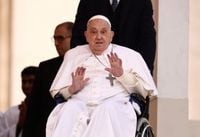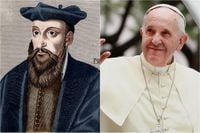The death of Pope Francis on Monday, April 21, 2025, has not only left the Catholic community mourning but has also reignited interest in ancient prophecies surrounding the future of the Church. Among these is the "Prophecy of the Popes," attributed to Saint Malachy, which suggests that Francis may be the last pope before the end of the world.
At 88 years old, Pope Francis passed away after battling double pneumonia. His death has prompted discussions about the implications of his papacy and the prophecies that have long surrounded it. The Prophecy of Saint Malachy, a document believed to be over 900 years old, was recently rediscovered in the Vatican archives. It predicts that Francis, the 112th pope, is the final pontiff before the apocalyptic events described in the prophecy unfold.
According to the ancient manuscript, written by the Irish archbishop Saint Malachy in 1139, each pope is given a symbolic phrase in Latin. The last pope is referred to as "Petrus Romanus"—Peter the Roman. The prophecy ominously states that during the final persecution of the Roman Church, Peter will shepherd his flock through tribulations, after which "the city of seven hills will be destroyed, and the terrible Judge will judge the people." This dire prediction has led some to believe that the end of the world could occur as early as 2027, based on calculations linked to the papacy of Sixtus V.
This prophecy was first published in 1595 by Benedictine monk Arnold de Wyon, but its authenticity is widely disputed. Many historians, including papal historian Anura Guruge, argue that it is a forgery created for political purposes in the 16th century. Despite this, the first 74 predictions about popes were notably accurate, which has fueled ongoing fascination with the text.
As people reflect on Francis's legacy, some interpretations of the prophecy suggest that while he is not named Peter, his choice of the name "Francis"—in homage to Saint Francis of Assisi—might symbolically link him to the last pope. Others argue that the true "Petrus Romanus" may still be to come, perhaps even his successor.
In addition to the Prophecy of Saint Malachy, the recent discussions have also brought Nostradamus's predictions back into the limelight. In his book "Les Prophéties," published in 1555, Nostradamus foretold the death of a "very old" pope, warning of a potential weakening of the Catholic Church's influence. He wrote, "Through the death of a Pontiff very old, a Roman of good age will be elected; of him, it will be said that he weakens his seat, but for a long time he will sit and in biting activity." Nostradamus also hinted at the emergence of a "young man with dark skin" as a possible successor, stirring speculation about the future leadership of the Church.
The Vatican confirmed that Pope Francis passed away after weeks of hospitalization due to pneumonia. His health had been deteriorating, and he had been hospitalized multiple times over the past year. On the weekend before his death, he had made public appearances, including a blessing in St. Peter's Square on Easter Sunday.
The upcoming conclave, which will select his successor, is poised to take place in a couple of weeks. During the mourning period, Francis's body will lie in state at St. Peter's Basilica before being buried at Santa Maria Maggiore, breaking from the tradition of his predecessors.
The Church now faces a complex landscape, with a decline in followers in Europe and the Americas, juxtaposed with growth in Africa and Asia. The next pope will inherit significant challenges, including internal divisions between conservative and progressive factions, financial scandals, and the need to connect with an increasingly secular world.
Among the names being discussed as potential successors are Cardinal Peter Turkson of Ghana, known for his moderate stance and focus on social justice, and Cardinal Robert Sarah of Guinea, who holds conservative views. The possibility of electing an African pope would be a historic first and adds another layer of intrigue to the discussions surrounding the future of the papacy.
Despite the skepticism surrounding the prophecies, they continue to captivate public imagination, blending faith, history, and the fear of the unknown. As the world watches for the white smoke signaling the election of the next pope, the weight of tradition and expectation looms large over the future of the Catholic Church.
In the wake of Pope Francis's passing, the narratives of both the Prophecy of Saint Malachy and Nostradamus's visions have surged in popularity, particularly on social media, where discussions about their implications have sparked both curiosity and concern. The intertwining of these prophecies with the realities of the Church's future underscores the enduring power of belief and the human desire to understand what lies ahead.
As the Catholic community prepares for the transition, the echoes of prophecy serve as a reminder of the complex tapestry of faith, history, and the ever-evolving nature of the Church in a modern world.




